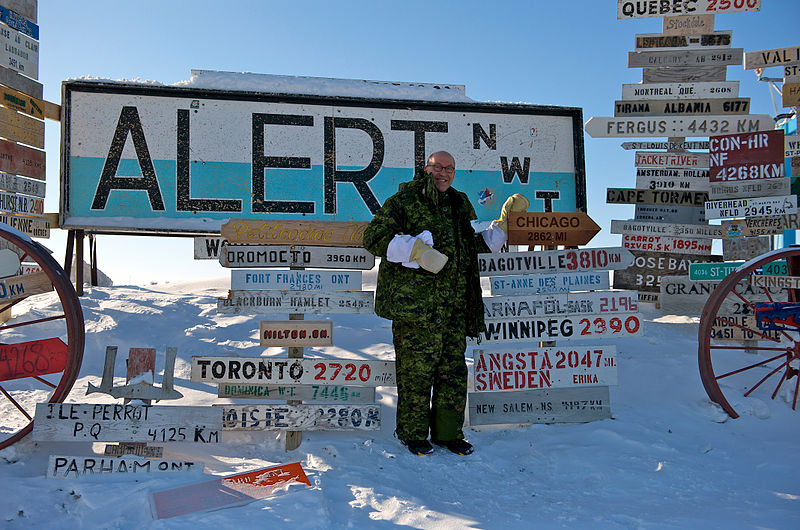The issue of Northern defence is a polarizing one, between those stressing the need for strong military commitment to the region and those that suggest restraint and cooperation. The hawkish side notes that the lack of a direct threat draws focus away from an otherwise deteriorating security situation, asnumerous Arctic and non-Arctic states are building up their Arctic combat-capable forces. The opposing viewpoint is that the Arctic has actually been an excellent example of global cooperation rather than conflict.This perspective holds that the threat to Canada’s North is overblown.
Canada consequently does not have a ‘full-service’ military with a full range of capabilities. The country does not possess nuclear weapons, despite having cutting-edge nuclear technology, does not have an aircraft carrier anymore despite operating three between 1946 and 1970, and lacks nuclear-powered submarines able to operate under sea-ice, despite having the second longest Arctic coastline.
The most pressing issue is the establishment of Canada’s Arctic borders. The relatively low-level disputes with Denmark concerning Hans Island and with the US over parts of the Beaufort Sea are not cause for alarm or signs of impending conflict. It is better foreign policy for Canada to relegate these tensionsto the back burner or bilaterally work out solutions with two very friendly nations.
However, Russia’s claim to the North Pole as an extension of its Lomonosov Ridge is more complicated. This is because Canada also claims the Pole as an extension of its Ellesmere Island landmass. Yet the way forward in this case is also via diplomacy. In fact, claims in the Arctic are not haphazard but based on scientific evidence and furthermore Canadian cooperation with Russia is not uncommon.Given Russia’s interests and dominating presence in the Arctic, it is unlikely that any pending dispute will be resolved without Russian support. At the same time, geographic and economic realities suggest that Russia has the most to gain by orderly and lawful development.
Canadian politicians are advised that political rhetoric, for electoral purposes, does not affect or tarnish Canada’s international cooperation with Arctic states. Importantly, these politicians need to downplay their reactions on Russia’s Arctic actions, and focus more on the behind-the-scenes cooperation between Ottawa and Moscow that has helped maintain the peace to date.
From a military standpoint, Canada is not in any position to enforce sovereignty against ships from the US, Russia, China or many European Union countries, at the moment. With historic defence spending levels of 1% to 1.5% of GDP, Canada has remained strong, secure and safe through recent times, ever since the start of the Cold War. Taking money from key programs like healthcare for increasing defencewould be futile, considering that any war would be either unwinnable, or unlikely. Canada is a rich country and is so because it maintains a reasonable balance of expenditure.
A small hike in defence expenditure, to around 1.75% of the GDP would be in the national benefit, however, as it would help maintain Arctic peace. In doing so, several recommendations could be implemented to better facilitate the sovereignty, security and regional economic development of the Arctic.
The construction of support facilities and bases in key arctic ports like Iqualuit, would serve to enhance the socio-economic and defence picture. This is because Russia and the United States are in the process of constructing northern bases including the requisite support systems. These bases can serve as employment centers for indigenous people, and could even possibly be at the forefront of NATO’s climate change action plan, receiving energy from wave motion in the Arctic Ocean, coupled with geo-thermal power. However, the bases will have to contend with considerable natural forces. As such, any base would have to be designed as a flexible bunker with an opening to the sea, protecting it from the elements, the sub-arctic permafrost layer on the ground, and the coldwater algae.
The possible introduction of a new hybrid ship type that can take on Arctic requirements, may be the best way. Currently, procurement plans include 6 Harry DeWolf class Arctic offshore patrol vessels, armed with only a bushmaster auto cannon and a browning machine gun. The Norwegian ship that inspired the Harry DeWolf, is armed with the 57 mm Bofors on the Halifax class, a 12.7 machine gun and surface to air missiles. Surely, more can be added to the Harry DeWolf. The Harry DeWolf class ships are plagued with delays in construction, with the first not even delivered as yet to the Royal Canadian Navy. Ideally, an Arctic patrol vessel should potentially have a reasonable profile and silhouette, and fast speed with environmentally friendly engines and engine systems. It should be able to withstand multiple direct hits, while providing accurate and effective rapid fire responses. This could potentially be done via the addition of enhanced armour plating, extensively used by both sides in both World War 1 and 2.
The introduction of enhanced sonar and radar systems to possibly detect even the stealthiest subs or aircraft is of paramount importance to Arctic security. These enhanced sonar systems can operate via the use of low frequency, highly sensitive radio signals, which would be able to possibly discover the cavitations of stealth subs. The procurement of Boeing E-7 AWACS aircraft would provide an extra layer of radar security to the Canadian Arctic. This would allow for faster interdiction of airborne threats to Canada and the Canadian Arctic.
Selecting an adequate fighter aircraft that meets Canadian requirements, would also be beneficial to Arctic security. Considering that most top-of-the-line aircraft are quite expensive, Canada has typically gone with purchasing secondhand. This is evident in the purchase of Australian F-18As. Though manytop-of-the-line planes are well-suited to Canadian requirements, they either lack interoperability or have not been considered by the Canadian government.
Relating to Arctic defence, Lt. Colonel Dittman points out that the paradigms have changed and that, “Canada needs to prepare for future conflicts, not past ones. The challenge lies in accurately foreseeing future challenges and responding to them before they manifest into unwieldy situations that catch the nation unprepared. As a maritime nation with three penetrable coastlines and a vast Arctic Archipelago, Canada’s future lies in ensuring the maritime commerce routes that intersect its territory remain open.”
More important than defense against attack by another country, is defense against other threats in the Arctic such as climate disasters or technical disasters, all of which the country is currently ill-prepared to manage and are more likely than a state-to-state conflict. With such measures employed as those noted above, Canada’s Arctic would not only be well defended against attack from another country, it would also be well defended from disasters, be they natural or man-made. After all, former Prime Minister Stephen Harper once said “the Arctic is a part of Canada’s identity, history, and culture. Either we use it or we lose it”.
Featured Image: United States Ambassador Jacobson with newly installed Chicago road sign at Alert, Nunavut by (2010) Daniel R. Harris via US Mission Canada https://commons.wikimedia.org/wiki/File:US_Ambassador_visits_Alert,_Nunavut.jpg Public Domain.
Disclaimer: Any views or opinions expressed in articles are solely those of the authors and do not necessarily represent the views of the NATO Association of Canada.




